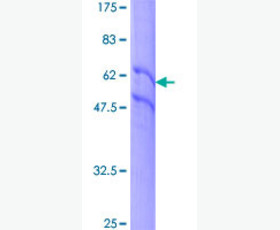Recombinant Mouse Tumor Necrosis Factor/TNFα
| Product name: | Recombinant Mouse Tumor Necrosis Factor/TNFα |
| Source: | E. coli |
| Purity: | Greater than 95% as determined by reducing SDS-PAGE. |
| Buffer Formulation: | Lyophilized from a 0.2 μm filtered solution of PBS, pH 7.4. |
| Applications: | Applications:SDS-PAGE; WB; ELISA; IP. |
| Storage: | Avoid repeated freeze/thaw cycles. Store at 2-8 oC for one month. Aliquot and store at -80 oC for 12 months. |
| UOM: | 100ug/50ug/200ug/1mg/1g |
| Source | E. coli |
| Description | Recombinant Mouse Tumor Necrosis Factor alpha is produced by our E.coli expression system and the target gene encoding Asp89-Leu235 is expressed. |
| Names | Tumor Necrosis Factor; Cachectin; TNF-Alpha; Tumor Necrosis Factor Ligand Superfamily Member 2; TNF-a; Tumor Necrosis Factor, Membrane Form; Tumor Necrosis Factor, Soluble Form; Tnf; Tnfa; Tnfsf2 |
| Accession # | P06804 |
| Formulation | Lyophilized from a 0.2 μm filtered solution of PBS, pH 7.4. |
| Shipping |
The product is shipped at ambient temperature. |
| Reconstitution |
Always centrifuge tubes before opening. Do not mix by vortex or pipetting. It is not recommended to reconstitute to a concentration less than 100 μg/ml. Dissolve the lyophilized protein in ddH2O. Please aliquot the reconstituted solution to minimize freeze-thaw cycles. |
| Storage |
Lyophilized protein should be stored at < -20°C, though stable at room temperature for 3 weeks. Reconstituted protein solution can be stored at 4-7°C for 2-7 days. Aliquots of reconstituted samples are stable at < -20°C for 3 months. |
| Biological Activity |
The ED50 for this effect is typically 6.8 pg/mL. |
| Purity |
Greater than 95% as determined by reducing SDS-PAGE. |
| Endotoxin | Less than 0.1 ng/µg (1 IEU/µg) as determined by LAL test. |
| Amino Acid Sequence |
MDKPVAHVVANHQVEEQLEWLSQRANALLANGMDLKDNQLVVPADGLYLVYSQVLFKGQGCPDYV LLTHTVSRFAISYQEKVNLLSAVKSPCPKDTPEGAELKPWYEPIYLGGVFQLEKGDQLSAEVNLP KYLDFAESGQVYFGVIAL
|
| Background | Tumor Necrosis Factor (TNF) is a member of the Tumor Necrosis Factor family. TNF exists as a homotrimer and interacts with SPPL2B. TNF is mainly secreted by macrophages and can induce cell death of certain tumor cell lines. TNF is a key cytokine in the development of several inflammatory disorders. It contributes to the development of type 2 diabetes throught its effects on insulin resistance and fatty acid metabolism. |














